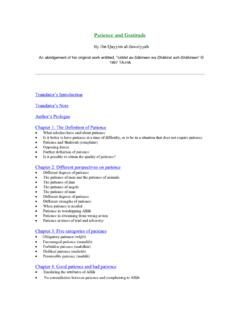Transcription of Biographies of the Companions (Sahaabah) - Mission Islam
1 Biographies of the Companions ( sahaabah ) Biographies of the Companions ( sahaabah )Brought to you courtesy of ISL SoftwareThe sahaabah were the Companions of Prophet Muhammad (saas). They are described in glowing terms by the Prophet (saas) as the following hadith from Sahih Muslim shows:Book 30, Number 6159 Narrated Aisha:A person asked Allah's Apostle (peace be upon him) as to who amongst the people were the best. He said: Of the generation to which I belong, then of the second generation (generation adjacent to my generation), then of the third generation (generation adjacent to the second generation).Below is a partial list of some of the Companions of the Prophet (saas). Their lives remain a source of inspiration for the later generations of Muslims, including today's.
2 May Allah be pleased with all of Ibn BishrAbdullah Ibn AbbasAbdullah Ibn Hudhafah As-SahmiAbdullah Ibn JahshAbdullah Ibn Mas'udAbdullah Ibn SailamAbdullah Ibn UmarAbdullah Ibn Umm MaktumAbdur-Rahman Ibn AwfAbu Ayyub Al-AnsariAbu Dharr Al-GhifariAbu Musa Al-AshariAbu HurayrahAbu Sufyan Ibn Al-HarithAbu Ubaydah Ibn Al-JarrahAbu-d DardaaAbu-l Aas ibn ar-RabiahAdiyy Ibn HatimAishah Bint Abi BakrAl-Baraa Ibn Malil Al-AnsariAmr Ibn Al-JamuhAn-Nuayman Ibn AmrPage 1 Biographies of the Companions ( sahaabah )An-Numan Ibn MuqarrinAt-Tufayl Ibn Amr Ad-DawsiAsmaa Bint Abu BakrBarakahFatimah Bint MuhammadFayruz Ad-DaylamiHabib Ibn Zayd Al-AnsariHakim Ibn HazmHudhayfah Ibn Al-YamanIkrimah Ibn Abi JahlJafar Ibn Abi TalibJulaybibKhabbab Ibn Al-ArattMuadh Ibn JabalMuhammad Ibn MaslamahMusab Ibn UmayrNuaym Ibn MasudRabiah Ibn KabRamlah Bint Abi SufyanRumaysa Bint MilhanSad Ibn Abi WaqqasSaid Ibn Aamir Al-JumahiSaid Ibn ZaydSalim Mawla Abi HudhayfahSalman Al-FarsiSuhayb Ar-RumiSuhayl Ibn AmrTalhah ibn UbaydullahThabit Ibn QaysThumamah Ibn UthalUbayy Ibn KabUmayr Ibn Sad Al-AnsariUmayr Ibn WahbUmm SalamahUqbah Ibn AmirUtbah Ibn GhazwanZayd Al-KhayrZayd ibn ThabitPage 2 Abbad Ibn Bishr It was the fourth year after the Hijrah.
3 The city of the Prophet was still under threat from within and without. From within. the influential Jewish tribe. the Banu anNadir. broke their agreement with the Prophet and made plans to kill him. For this, they were banished from the city. This was in the month of Safar. Two months of uneasy quiet passed. Then the Prophet received news that tribes from distant Najd were planning an attack. To pre-empt them. the Prophet gathered a force of over four hundred men. and leaving one of his Companions Uthman ibn Affan. in charge of the city, set out eastwards. Among this force was the young Madinan, Abbad ibn Bishr. Arriving at Najd, the Prophet found the habitations of the hostile tribes strangely deserted of men.
4 Only women were about. The men had taken to the hills. Some of them regrouped and prepared to fight. The time of Salat al-Asr (the afternoon prayer) came. The Prophet feared that the hostile tribesmen would attack them during prayer. He arranged the Muslims in ranks and divided them into two groups and performed the prayer as the Salat al-Khawf (the Prayer of Fear). With one group he performed one rakah wh ile the other group stood on guard. For the second rakah the groups changed places. Each group completed its prayer with one rakah after the Prophet had On beholding the disciplined ranks of the Muslims the hostile tribesmen became uneasy and afraid. The Prophet had made his presence felt and something of his Mission was now known at first hand in the central highlands of Arabia whence he departed peacefu lly.
5 On the way back, the Prophet pitched camp in a valley for a night. As soon as the Muslims had settled their camel mounts, the Prophet peace be on him, asked: "Who will be our guard tonight?" "We, O Messenger of God," said Abbad ibn Bishr and Ammar ibn Yas ir both of whom had been paired off as 'brothers' by the Prophet when he arrived in Madinah after the Hijrah. Abbad and Ammar left for the mouth of the valley to take up duty. Abbad saw that his "brother" was tired and asked him: "What part of the night do you wish to sleep, the first or the second?" "I shall sleep during the first part," said Ammar who was soon fast asleep quite close to Abbad. The night was clear, calm and peaceful. The stars, the trees, and the rocks all appeared to celebrate in silence the praises of their Lord.
6 Abbad felt serene. There was no movement, no threatening sign. Why not spend the time in ibadah (worship) and recit ing the Quran? How delightful it would be to combine the performance of Salat with the measured recitation of the Quran which he so much enjoyed. In fact Abbad was enthralled by the Quran from the moment he first heard it being recited by the mellow and beautiful voice of Musab ibn Umayr. That was before the Hijrah when Abbad was just about fifteen years old. The Quran had found a special place in his heart and day and night thereafter he would be heard repeating the glorious words of God so much so that he became known among the Prophet's Companions as the "friend of the Quran". Late at night, the Prophet once stood up to perform the Tahajjud Prayer in Aishah's house which adjoined the masjid.
7 He heard a voice reciting the Quran, pure and sweet and as fresh as when the angel Jibril revealed the words to him. He asked: "Aishah, is that the voice of Abbad ibn Bishr?" "Yes, O Messenger of God," replied Aishah. "O Lord, forgive him," prayed the Prophet out of love for him. And so in the stillness of the night, at the mouth of the valley in Najd, Abbad stood up and faced the Qiblah. Raising his hand in surrender to God, he entered into the state of Prayer. Finishing the compulsory opening chapter of the Quran, he began recit ing Surah al-Kahf in his sweet, captivating voice. Surah al-Kahf is a long Surah of one hundred and ten verses which deals in part with the virtues of faith, truth and patience and with the relativity of time.
8 While he was thus absorbed in reciting and reflecting upon the divine words, eternal words of illumination and wisdom, a stranger stalked the outskirts of the valley in search of Muhammad and his followers. He was one of those who had planned to attack th e Prophet but who had fled into the mountains on the approach of the MusIims. His wife whom he had left in the village had been taken as a hostage by one of the Muslims. When he eventually found that his wife was gone, he swore by al-Lat and al-Uzzah that he would pursue Muhammad and his Companions and that he would not return unless he had drawn blood. From a distance, the man saw the figure of Abbad silhouetted at the mouth of the valley and he knew that the Prophet and his followers must be inside the valley.
9 Silently he drew his bow and let fly an arrow. Unerringly it embedded itself in Abbad's flesh . Calmly, Abbad pulled out the arrow from his body and went on with his recitation, still absorbed in his Salat. The attacker shot a second and a third arrow both of which also found their mark. Abbad pulled out one and then the other. He finished his recit ation, made ruku and then sujud. Weak and in pain, he stretched out his right hand while still in prostration and shook his sleeping companion . Ammar awoke. Silently, Abbad continued the Salat to its end and then said: "Get up and stand guard in my place. I have been wounded." Ammar jumped up and began to yell. Seeing them both the attacker fled into the darkness. Ammar turned to Abbad as he lay on the ground, blood flowing from his wounds.
10 "Ya Subhanallah (Glory be to God)! Why didn't you wake me when you were hit by the first arrow?" "I was in the midst of reciting verses of the Quran which filled my soul with awe and I did not want to cut short the recitation. The Prophet had commanded me to commit this surah to memory. Death would have been dearer to me than that the recitation of this surah should be interrupted." Abbad's devotion to the Quran was a sign of his intense devotion to and love for God, His Prophet and His religion. The qualities he was known for were his constant immersion in ibadah, his heroic courage and his generosity in the path of God. At times of sacrifice and death, he would always be in the front line. When it was time for receiving his share of rewards, he would only be found after much effort and difficulty.




